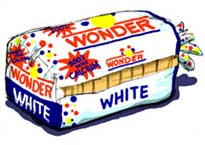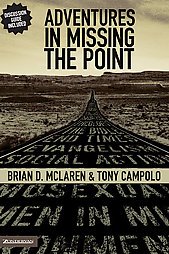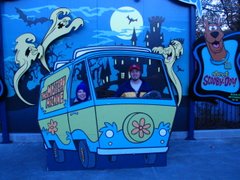 John 6:35-51
John 6:35-51I was afraid I was going to sound a bit repetitive, not just because I assumed someone else would be doing the homily this week, and would be able to give a different perspective on this passage, but because the passage we read today from John 6 is simply a continuation of the sermon we were listening to as Jesus spoke in the synagogue last week. I thought – what else do we have to learn from this?
I see I was wrong. Even though it seems like he keeps saying the same thing over and over again.
He keeps saying a very strange and dangerous thing, “I am the bread of life,” . . . The crowd is skeptical already, looking for a plausable explanation as to why and how he can make these claims. We already saw that when he said these things last week; Jesus was in fact suggesting that faith is based not on a set of beliefs, concepts, propositions, but on a person itself. And more on this now, we come to “The Sermon, Part II: Up to and Over the Edge.”
Jesus doesn’t just make up these claims of divine Sonship. He draws on the richest and deepest memories of the Jews to connect himself to the expectations and assumptions they had already made. More like, he picks the scab of exile, separation, frustration and begins to clean out an old wound. He brings up their desert wandering: 40 years of grumbling, mumbling under their breath, and always looking sideways for the next big thing. Remember God in the wilderness -- your lack of faith and God’s relentless provision and the inevitable consequences of sin? These wanderers were literally fed every single day with bread from heaven, but they did not ever see the promised land.
Jesus draws a direct parallel between who he is and the God of manna and quail, the God of water from a rock, the very IAM of Moses’ burning bush. They should know him; they should recognize him as their own. Their beloved Scriptures point to him, and they have embraced His Laws.
Yet His I AM’s literally begin to “flesh-out” the veiled, terrible face of Yahweh. Ordinary earthy images that somehow transform into eternal reality.
I AM . . . the light of the world.
I AM . . . the gate for the sheep.
I AM . . . the good shepherd.
I AM . . . the resurrection and the life.
I AM . . . the true vine.
and of course,
I AM . . . the bread of life.
Do you notice their reaction? We might as well be back in Exodus – and John goes right along with this – for he says the crowd complained. That’s right – in political exile, still wandering -- their God comes to them face to face, and just like in the days of old, they murmur under their breath, grumble quietly to their closest neighbor.
But Jesus doesn’t just stop there. He’s taking them to the edge. Now it is time to push them over. “Very truly, I tell you, whoever believes has eternal life.” Again, “I am the bread of life.”
Now a quick aside regarding this word “believe.” We use this verse a lot, or at least something close to it, when we “present the gospel,” to a seeker. Our A,B,C’s are as easy as: Admit you’ve sinned, Believe in Jesus Christ, and Confess Him as your Savior. Simple. Easy. Viola!
But hopefully when we use this tool in bringing our neighbors to Christ, as when Christ himself said it here, we are not just speaking of a ubiquitous assent or indisputable claim. Belief is actually more than just saying you think it’s true or think it exists. I can believe in ghosts. They still may not exist. Cogito ergo sum – chucked out the window.
Perhaps belief and eternal life is not so much about “think it’s true and because you believe, you will last forever” (thank you, Chicago). Eternal life, sure, it’s a reward. But it’s not so much about that particular pattern of cause and effect – in other words, God saying, “I’ll scratch your terms of existence if you scratch mine,” -- as it is the inherent result of being in understanding, deep intimate knowledge of Jesus Christ himself. The Giver and Sustainer of Life.
The fact that we would experience eternal life is only possible because it is inextricably linked and rooted in who Jesus is.

Now here is where I think we’ve messed it up.
What if we’ve got it all wrong? What if where we’re going, what we’ve always done and have always thought we were supposed to do is completely wrong. Off base. Out in left field. Wrong.
What if what we’re supposed to be doing and what we’re supposed to be about is what we’ve unwittingly been working against. For all our good intentions, we’ve missed the point . . . we’re wandering in the desert, expecting the promised land, looking and making up signs to point us to it, and in the end we may never reach it.
I wonder this aloud, and in relation to Jesus’ claims about our belief and living forever and being “bread,” because I’ve been reading a very interesting and probably dangerous book, Adventures in Missing the Point by Tony Campolo and Brian McClaren.
They talk about the Kingdom of God, which interestingly is what defined Jesus’ earthly ministry. Jesus’ preaching was not all fire and brimstone, though he warned of being cast out into the darkness. His teaching was not a neat outline articulating the “Ten Steps to Eternal Life,” though he spoke of his going to prepare a place. His real message was quite straightforward, “The Kingdom of God is at hand.”
It is HERE. And it’s about life NOW. We need not look anywhere else.
So salvation, McClaren and Campolo maintain, is not so much about being bailed out of any particular political exile, or for that matter, being deterred from morally repugnant behavior. But neither did salvation mean being tractor-beamed up into a celestial utopian bliss never to deal with the dirty, smelly, indiscreet world again. Instead, salvation was literally being rescued from the constant oppression of any and all of these corrupt circumstances to live the kind of life God created us to live.
Then McClaren actually suggests,
“If our theologies make us focus on the eternal and the individual (i.e. getting my soul into heaven) so that we avoid God’s concern for the historic and the global (i.e. God’s will being done on earth as well as in heaven), then the more people we win over to our theologies the fewer people will care about God’s world here and now.”
”The more converts we make, the worse the world will become.”
“If God really cares about justice in this world here and now, and if we are converting people away from the concern, then we are working against God. We could inadvertently become enemies of God’s wishes.”
Now I am not saying that we don’t have something to look forward to – we certainly await our reigning King to return in this already-not yet Kingdom. But when he returns, he’s not throwing this world away.
He’s proved this through His Incarnation – simply by becoming man, our God proved that flesh and spirit are no longer, or maybe never were, at war. He did not come for us to merely believe with our minds, and in gaining a special otherworldly knowledge about him, He himself could never be grasped, embraced . . . eaten.
For Jesus says, “Whoever eats of this bread will live forever; and the bread that I will give for the life of the world is my flesh.”
Salvation through Jesus Christ is real – spread through every substance, compound, molecule, and atom of Creation, for Christ’s personal sacrifice was neither a mental game nor a mystical battle. His sacrifice was a sacrifice of sarx – flesh – you know, the earthy, prone, vulnerable – that stuff we all have to deal with too. Jesus physically died upon a cross, while ribs cracked under his own weight, and blood poured from gaping wounds in his hands and feet, and water poured from his side.
This is our Bread.
This is our Daily Bread.
The Bread we ask for through gritted teeth. Or crossed fingers. Or faraway looks. Someday everything will be alright . . . when we all get to heaven.
But thank God, it’s not when all the bills are paid, or when the school year is finally over, or when Vacation Bible School is finished. Christ did not tell us to wait. He didn’t wrap us up in white robes and lock us in a little room to hold hands and drink some funky Kool-Aid – and for goodness sakes, get up here as fast as you can. He told us to go. Go into the world. Go and make disciples and baptize them into the Kingdom. He wanted us to Live.
Here, today, in celebrating the elements of Christ’s Body around the Table, and as Christ’s Body in the world, we usher in the Kingdom of God. As citizens of this Kingdom seeking to do his explicit will, we demonstrate belief in his Son for we also incarnate the very Spirit of Christ that is present and active in THIS world. This is more than a foretaste of the day when Christ does return to a new heaven and new earth.
So, what is our grumbling? For bread we believe we have never received.
We get to taste the Kingdom.
Live as though we believe. Believe that Jesus is Lord. He is Lord of Creation and Lord of our lives.
Let our ordinary lives reflect our eternal lives, the eternal life that we enjoy even today.







